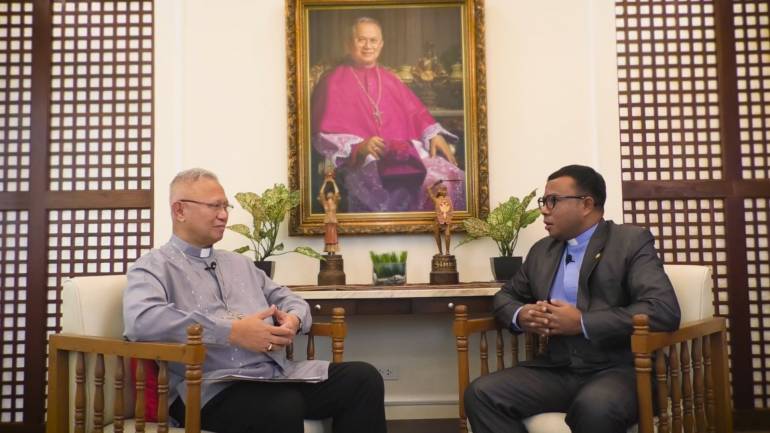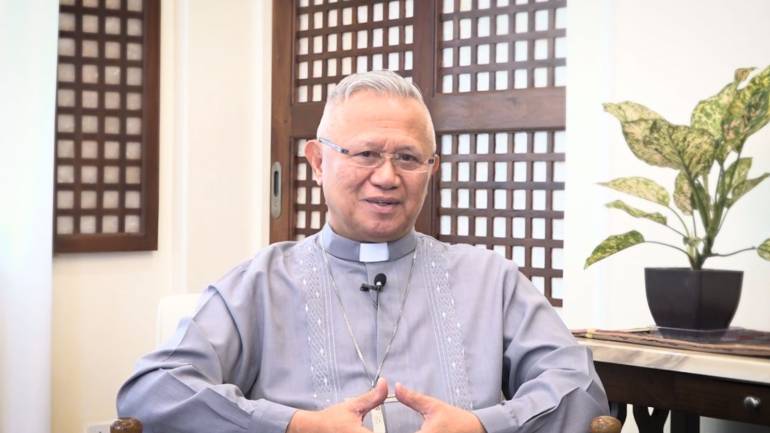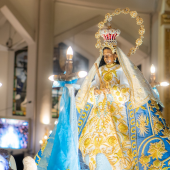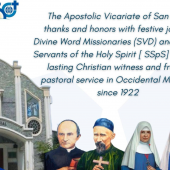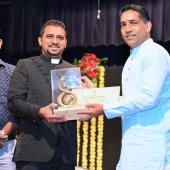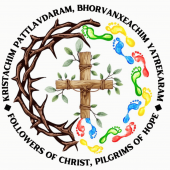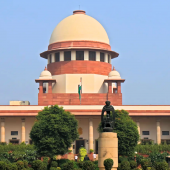Voice of Archbishop Palma of Cebu, Philippines
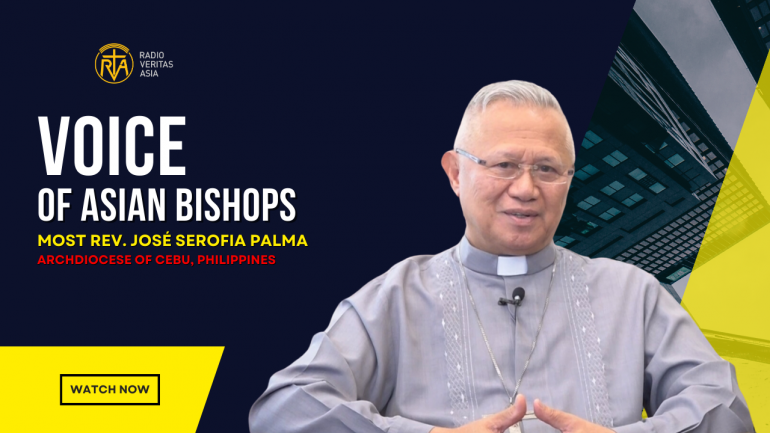
Radio Veritas Asia (RVA), through its editor, Fr. Kasmir Nema, SVD, talks with the Most Reverend Jose Palma of the Cebu Archbishop, one of Asia's largest dioceses.
According to Palma, the archdiocese, established in 1595, is one of the largest in terms of population and the number of priests. As a province, Cebu may have over 5 million and around 4 million Catholics with around 625 priests.
“We have already made a proposal to be submitted to Rome to divide Cebu, but our term is Sugbswak, which means Cebu giving birth to two new dioceses,” said Palma, adding that Cebu is known as the Church of Senyor and the Santo Nino, among others.
“In terms of programs, we make it a point to cultivate people's devotional lives. We are Marian Church; there's a lot of Marian shrines in Cebu, and it is our joy to develop that, not to cultivate that,” said the archbishop.
They increasingly recognize that faith, as Mother Teresa stated, should manifest in love and action. The Holy Father invites everyone to make faith more visible through good works and to think of ways to reach out to people, said Palma.
He recently said one of the most accepted ways we reach out to people is through Cebu - Caritas (meaning love), which was launched during the birthday of the venerable Teofilo Camomot, who is considered Cebu’s son.
It is their way of expressing their faith. Express blessings with love through various projects aimed at helping the poor, such as providing food, housing assistance, disaster relief, and medical missions.
Palma said they have 165 parishes and around 130 parishes that support Caritas, which is equivalent to the social action arm of many dioceses.
“My vision is the vision of the priests, namely because we are in vision to divide, not the diocese, then we just hope that the mother church will provide the ministry we have, and the churches will begin to also share the same enthusiasm of the mother Church,” said the archbishop.
As to the issue of prostitution in Cebu, Palma said he first came to Cebu 25 years ago, and the place where prostitutes (also known as commercial sex workers) are now around the area of the church in Santa Rosario.
Through the Kaagupayan Association, a Cebuano term that means some kind of relief, the people have reached out to them as their apostolate.
Asked how he developed his vocation, Palma said he had a “fascination with the mystery of the priesthood” as he tagged along with priests who preside over masses and other activities.
He said that the family is important because it is where the elders helped develop the habit of prayer. Every Sunday, they prayed the rosary, had devotion to the saints, and went to Masses.
After graduating from his secondary education, Palma’s bishop advised him to study at the National Seminary in the United States, then he came back to the Philippines to teach, studied in Rome, and then again returned to the country.
Palma, in turn, also influenced other vocations in the seminary until that day, when he said, “I have to try the parish life.” After six months at the Institute of Learning, he was assigned to a parish and became a bishop.
After one year, his assignment was Eastern Samar. After seven years, he crossed the bridge and then received assignments in Leyte, establishing his identity as a man from the Visayas.
Palma considers a challenge “the journey with brother priests in the context of the poverty of the people,” where the basic ecclesial community is strong as they develop the capacity to reach out by making the sacraments also available to them.
He said Cebu, being a huge diocese, tends to maintain that status quo even in public in many ways, especially since priests can be content with Cebu because it is a religious place and people are collaborative.
"The main challenge now is the idea of mission duty, of reaching out rather than going to the periphery." We should live out what the Pope says as an expression of our solidarity and fraternity in the huge diocese. When there are 500 of you, this isn't easy. How can you be intimate?” said Palma.
He explained his episcopal motto, non-Nobis Domine, or "not to us, O Lord," to mean that whatever he does and whatever apostolate he performs, whatever ministry, the recognition, the honor, and, of course, the glory should never be sought after. "God is always there. So not to us, Lord, not to us, but your name gives the glory.”
With the triple dialogue thrust of the Federation of Asian Bishops Conference to mean dialogue with the poor culture and the religion, Palma said having worked at the dicastery of culture in Rome turned useful. “I feel consoled that in many situations where we have to reach out to the poor, the culture of Cebu is also very cooperative,” said Palma.
“We have ways of making associations and establishments aware that when we need food, we have the means to carry food to certain sectors of the barangay (village). The open-implemented way of reaching them is through medical missions. We have a lot of medical associations that find it a Christian way of reaching out to the poor," he said.
Asked to address the young people on the use of social media in evangelization, Palma thanked them because it is the direction of the church, especially when many of them are on it, with no less than the Holy Father encouraging it.
"Young people, this is your gift. Become influencers. I'm amazed at how fast and talented they are, as well as the various ways they can reach out to one another," he said.
Citing Saint Francis Xavier, who had to travel hundreds of miles to other people with social media, Palma told the youth, “You can stay in your room, and you can reach out to them and be an influencer, an instrument of joy, consolation, and hope all through."
"They think being influencers is really beneficial to many who need company, as well as, of course, friends' assistance and ways to make them realize that despite what separates us, media unites us," said the Archbishop.
In his diocese, Palma stressed the significance of actively listening to numerous individuals, as decisions are frequently reached through consultations and meetings, even if the process may be slow.
"I believe that when we reach a point where we are comfortable with each other, when we accept each other for our gifts and talents, and when we know that each one has something good to share, I think more and more the goodness of this community will shine."And this is a good process of synodality," said Palma.
He gave practical recommendations for Catholic leaders, priests, and laypeople in his archdiocese, hoping that they would become more synodal in their way of thinking and approach to the mission.
“I think we should give more time for the spirit to work in our midst by allowing as many as possible to come out with their honest-to-goodness perceptions of many things. And then hopefully, in the end, something better would happen rather than us thinking we know better and just dictating to the community,” said Palma.
Asked about his role as a member of the recently established new dicastery cultures in education by Pope Francis, he said it is “as much as possible to establish educational centers as well as centers for culture, where they can happen. And we just hope that constant gathering together and listening to each other will develop that spirit of dialogue.”
The Santo Nino, being one of the oldest and biggest devotions in the Philippines, has influenced his people's faith in the sense that “Santo Nino is not only the little boy, but Christ grew up to be a man who taught us about the Father's plan and taught us about living as sisters and brothers to each one that has to get involved in the renewal of society.”
As to the argument by some that Cebu has to replace Imperial Manila as the epicenter of Catholicism, Palma said they respect Manila and instead said, We are grateful for who we are in Cebu. You know, for the Catholicity that is typical of Cebuano, for the city that still has a provincial outlook in a way, and even for how media seems to be, as we say, the community media now has a different tenor in Manila.”
Archbishop Palma said to the listeners of RVA: "We may be separated by islands, distances, or even languages, but some things unite us, meaning our feeling that we are brothers and sisters, feeling that we are one in our hopes and dreams as a community, our longing for peace, and a desire that despite the many trials, struggles, and problems we know, there is something deep in us that can make us survive all of this."(MTV)
Radio Veritas Asia (RVA), a media platform of the Catholic Church, aims to share Christ. RVA started in 1969 as a continental Catholic radio station to serve Asian countries in their respective local language, thus earning the tag “the Voice of Asian Christianity.” Responding to the emerging context, RVA embraced media platforms to connect with the global Asian audience via its 21 language websites and various social media platforms.





